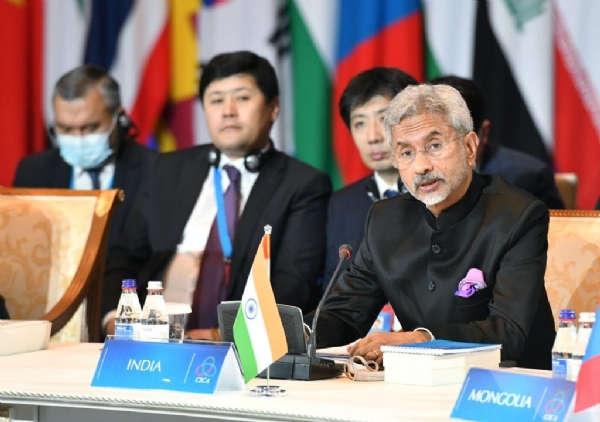'Vasudhaiva Kutumbakam' is India's belief; the world must unite against terrorism says S Jaishankar
12 Oct 2021 15:07:26
Nur-Sultan, Oct12: India said on Tuesday that Cross-border terrorism, is not statecraft but "simply" another form of the menace, and it urged the world community to unify against it as seriously as it fights against climate change and pandemics. External Affairs Minister S Jaishankar is in Kazakistan where he stated at the 6th edition of the ‘Conference of Interaction and Confidence Building Measures in Asia' (CICA) today that connectivity must follow the most basic concept of international relations-respect for sovereignty and territorial integrity.

''If peace and development is our common goal, the biggest enemy we must overcome is terrorism. In this day and age, we cannot countenance its use by one state against another. Cross-border terrorism is not statecraft; it is simply another form of terrorism,'' he urged the international community.
He called up the committee by saying,” The world must unite against this menace, as seriously as it does on issues like climate change and pandemics.'' ''Any calculation that extremism, radicalization, violence, and bigotry can be used to advance interests is a very short-sighted one. Such forces will come back to haunt those who nurture them. Lack of stability will also undermine our collective efforts to get Covid under control. The situation in Afghanistan is, therefore, of grave concern," he added.
Jaishankar had earlier this week stated that India was closely monitoring developments in Afghanistan and emphasised the need of the Taliban government to achieve the international community's expectations as outlined in UN Security Council Resolution 2593.
India has urged that " No country should take advantage of Afghanistan's fragile position and use it for its selfish goals." According to Jaishankar, the CICA's voice can help shape the global response to the developments in Afghanistan. "It should be noted that recent developments in Afghanistan have caused genuine anxiety. "The voice of CICA can help shape a worldwide response," he tweeted.
''As we build these modern arteries of commerce, it is essential that the most basic principles of international relations are observed. Respect for the sovereignty and territorial integrity of nations rank foremost among them,'' he said, despite China's assertiveness in the Indo-Pacific region. ''It is also important that connectivity building is a participative and consensual exercise, based on financial viability and local ownership. They must not serve other agendas,'' he said. China is embroiled in territorial disputes in the South and East China Seas. In recent years, Beijing has also made significant headway in militarizing its man-made islands.
On Monday, Jaishankar landed in Kazakhstan from Kyrgyzstan on the second part of his three-nation Central Asian tour, hoping to strengthen bilateral ties and discuss critical regional concerns such as the Taliban's takeover of Afghanistan following the withdrawal of US forces.